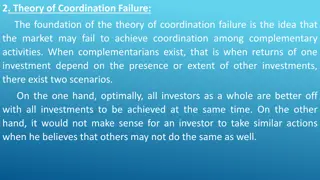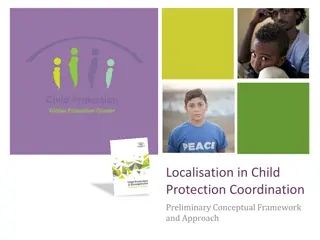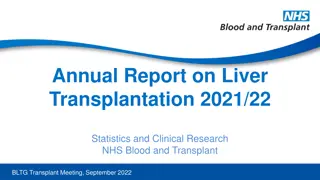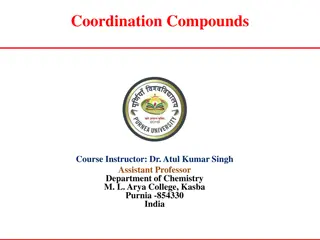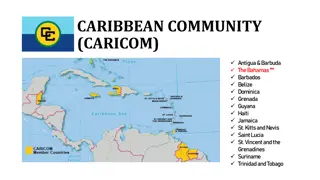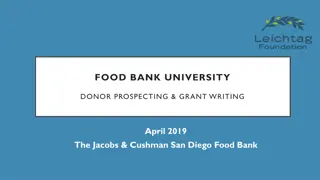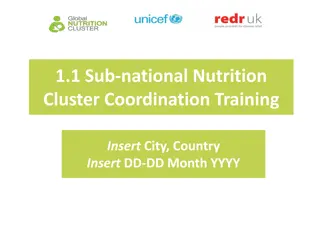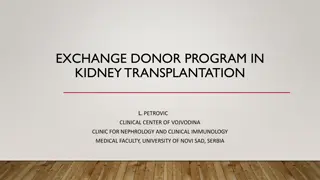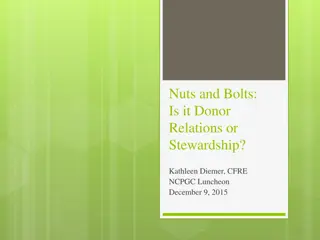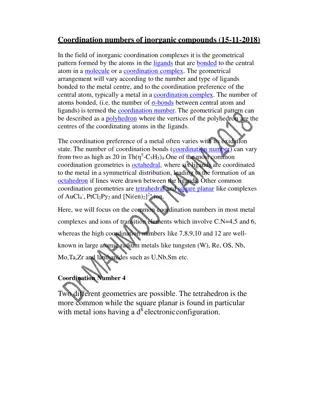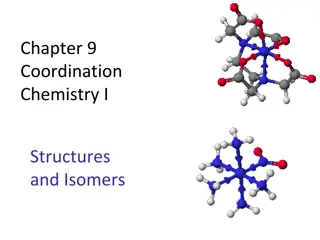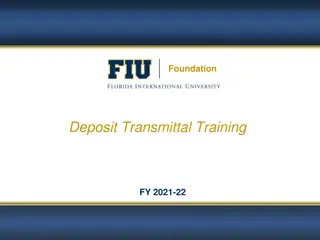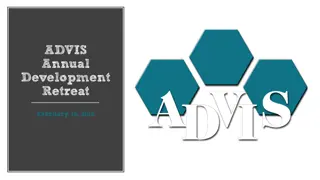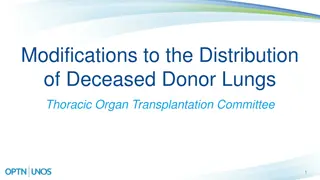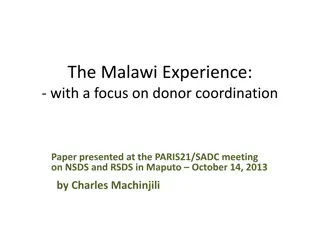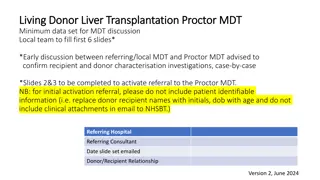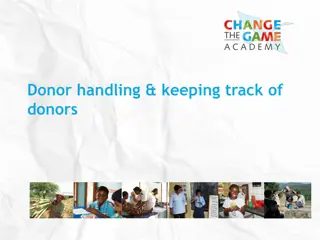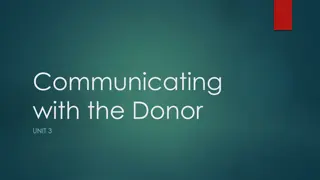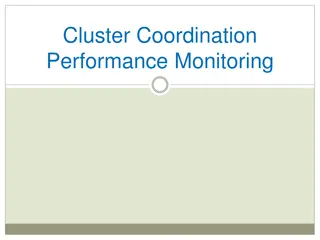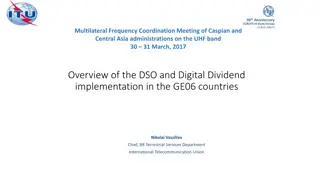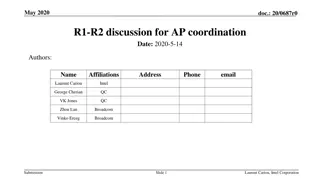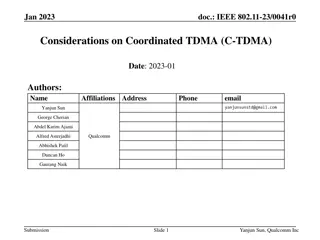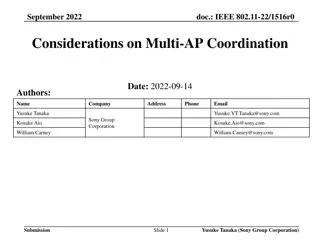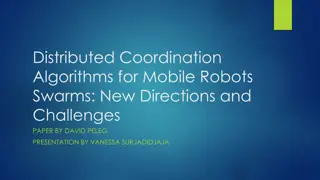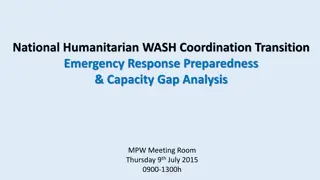Budget Execution Challenges in Somalia's Social Sectors
Addressing malnutrition in Somalia is hindered by low budget execution rates in the health and education sectors. Only a small portion of Official Development Assistance (ODA) is channeled through government systems, impacting service delivery and development financing. Donor-supported budgets for h
0 views • 32 slides
Introduction to Co-ordination Chemistry: Fundamentals and Applications
Explore the fascinating field of coordination chemistry, delving into the complexity of compounds and the coordination bonds that govern their structures. Discover the history, key concepts, and applications of coordination chemistry through a detailed examination of coordination compounds, bonding
13 views • 73 slides
Best Liver transplant hospitals in India
Best Liver Transplant Hospitals in India\nThe liver is a vital organ that performs important functions in the human body, including detoxification, metabolism, and the production of essential proteins. However, certain conditions such as liver failure, cirrhosis, or liver cancer may necessitate a li
0 views • 2 slides
Understanding Graft-Versus-Host Disease (GVHD) and Its Symptoms
Graft-versus-host disease (GVHD) is a potential complication following stem cell or bone marrow transplants, where donor cells attack the recipient's body. GVHD can occur in acute or chronic forms, presenting symptoms such as abdominal issues, skin rash, dryness, joint pain, and more. This autoimmun
0 views • 13 slides
Understanding the Theory of Coordination Failure in Markets
The theory of coordination failure explores how markets may struggle to achieve coordination among complementary activities, leading to suboptimal outcomes. It highlights scenarios where investors' actions depend on each other, emphasizing the role of government intervention to solve coordination is
2 views • 14 slides
Localisation in Child Protection Coordination: A Conceptual Framework
This presentation explores the preliminary conceptual framework and approach for localisation in child protection coordination. It delves into the roles of local actors, coordination systems, governance, decision-making, partnerships, and funding in promoting localisation efforts. The importance of
0 views • 22 slides
Mastering Recurring Donor Retention: Expert Insights for Sustainable Fundraising
Explore expert strategies and practical tips presented by fundraising guru Erica Waasdorp and marketing manager Sam Nyland on enhancing recurring donor retention. Learn how to prevent lapses, tackle cancellations, and optimize your process to ensure sustainable donor support. Dive into a 360-degree
0 views • 33 slides
Liver Transplantation Report 2021/22 Statistics & Research Findings
The Annual Report on Liver Transplantation 2021/22 presents detailed statistics and clinical research findings from the NHS Blood and Transplant BLTG Transplant Meeting in September 2022. The report covers an overview, transplant list, donor and organ supply, transplant activity, and outcomes. It hi
1 views • 45 slides
Understanding Temperature Effects on Donor and Acceptor Ionization in Semiconductors
Temperature plays a crucial role in the ionization of donor and acceptor atoms in semiconductors. In N-type semiconductors, the Fermi level lies below the conduction band, while in P-type semiconductors it lies above the valence band, with the position depending on temperature and impurity atoms. Do
1 views • 13 slides
Understanding Coordination Compounds and Ligands in Chemistry
Coordination compounds involve ligands that donate electron pairs to central metal ions. Ligands can be categorized based on the number of donor atoms they contain, such as mono-, bi-, tri-, tetra-, penta-, and hexadentate ligands. Each type of ligand has the ability to form bonds with the central m
2 views • 15 slides
Overview of CARICOM: TFA Strategy and Regional Initiatives
CARICOM, a Caribbean community comprising countries such as Antigua & Barbuda, Bahamas, Barbados, Belize, Dominica, Grenada, Guyana, Haiti, Jamaica, and others, is implementing a Trade Facilitation Agreement (TFA) strategy. This strategy focuses on transparency provisions, test procedures, single wi
0 views • 5 slides
Strategies for Effective Donor Prospecting and Grant Writing
Explore the essentials of successful donor prospecting, emphasizing the importance of finding new donors, building relationships, and submitting outstanding grant proposals. Learn how to engage with individuals and various groups to secure vital funding for your organization.
0 views • 16 slides
Sub-national Nutrition Cluster Coordination Training Workshop
Welcome to the Sub-national Nutrition Cluster Coordination Training Workshop aimed at sharing key concepts, tools, and approaches for effective coordination of nutrition in emergencies. This training prepares participants for working in Nutrition Cluster/Sector Coordination, promoting dialogue and s
1 views • 10 slides
Understanding Donor-Specific Antibodies in Kidney Transplantation
Antibodies against antigens in the major histocompatibility complex play a crucial role in kidney transplant rejection. Different types of donor-specific antibodies can lead to rejection at various stages post-transplantation. Methods to discover donor-specific anti-HLA antibodies include complement
0 views • 16 slides
National Histopathology Service for Organ Retrieval and Transplantation - Audit Findings
The need for a national histopathology service for organ retrieval and transplantation is highlighted, with a focus on the importance of histopathological analysis in assessing donor organ quality and identifying lesions for further investigation. The audit findings show the incidence of urgent hist
0 views • 17 slides
Building Greater Institutional Abundance: Relationship Strategies
Andrea B. Wasserman, President of Social Profit Ventures, presents strategies to inspire, bolster, and empower nonprofit campaigners in fostering major donor relationships for increased fundraising success. The agenda focuses on invigorating the nonprofit's vision and methodology, emphasizing passio
0 views • 31 slides
Enhancing Care Coordination Through Agreements
Effective care coordination is crucial for ensuring quality referrals and improving patient outcomes. Develop a Care Coordination Agreement to streamline the referral process, reduce waste, and enhance cost-effectiveness in healthcare delivery. This agreement serves as a roadmap for standardizing co
0 views • 49 slides
Understanding Donor Relations and Stewardship in Nonprofit Fundraising
Explore the essential concepts of donor relations and stewardship in nonprofit fundraising, emphasizing the importance of fostering long-term engagement with donors through high-quality interactions. Learn about gift acceptance, acknowledgement, recognition, and engagement practices to enhance donor
0 views • 16 slides
Coordination Numbers in Inorganic Compounds: Geometries and Structures
In inorganic coordination complexes, the coordination number refers to the number of atoms bonded to the central atom. Common geometries include octahedral, tetrahedral, and square planar, depending on the type and number of ligands. Transition metal complexes exhibit different coordination numbers
2 views • 8 slides
Understanding Coordination Chemistry: Structures, Isomers, and Naming
Exploring coordination chemistry involves understanding structures, isomers, naming conventions, and common coordination numbers, all essential in studying coordination compounds. Coordination compounds consist of central metals, ligands, and charge balancing ions. Naming involves listing cations, l
0 views • 46 slides
Insights from Donor Research and Supporter Focus
Uncover valuable insights from donor research and supporter focus in the charitable sector, highlighting the importance of understanding and engaging with donors effectively. Dive into qualitative interviews, quantitative surveys, and donor sentiments towards giving back and social responsibility. E
0 views • 12 slides
Foundational Training for Deposit Transmittal in FY 2021-22
Discover the key processes and documentation involved in completing deposit transmittal forms, supporting gift acceptance, and donor intent fulfillment. Learn about the life cycle of a deposit, what constitutes a charitable contribution, and how to identify different types of gifts. Understand the i
0 views • 22 slides
Streamlining Gift Processing Procedures for Donor and Member Services
Essential guidelines for handling and processing gifts within Donor and Member Services, including submission methods, necessary information, exceptions, receipting procedures, and fund transfer details. Contact details for assistance and specific scenarios requiring alternative processing methods a
0 views • 17 slides
Maximizing Donor Prospects Through Technology & Strategic Planning
Discover the latest strategies in identifying major gift donors through technology and data-driven insights presented at the ADVIS Annual Development Retreat. Experts from Schultz & Williams shared valuable insights on assessing fundraising performance, donor engagement, and growth opportunities in
0 views • 37 slides
Proposed Modifications to Deceased Donor Lung Distribution
This proposal aims to address issues with the current distribution of deceased donor lungs in thoracic organ transplantation. By removing DSA and implementing a 250 nautical mile circle around the donor hospital, the policy seeks to resolve inconsistencies, complications, and impracticalities in the
0 views • 26 slides
Enhancing Donor Coordination for Statistical Planning: The Malawi Experience
Explore the strategic planning and coordination efforts within Malawi's National Statistical System (NSS), focusing on donor coordination, steering committees, and statistical structures for effective management and resource mobilization. The NSS Strategic Plan, NSS Structure, NSS Steering Committee
0 views • 9 slides
Living Donor Liver Transplantation Proctor MDT Data Set
Living Donor Liver Transplantation Proctor MDT requires completion of specific recipient and donor information for referral activation. Slides include details on recipient and donor characteristics, blood work, and additional investigations needed for evaluation. Emphasis is placed on maintaining pa
0 views • 8 slides
Effective Donor Management Strategies for Nonprofits
Implementing effective strategies for donor handling, recording donor information, establishing payment acceptance processes, maintaining a comprehensive donor database, assigning responsibilities, and establishing communication and reporting processes are crucial for successful nonprofit fundraisin
0 views • 32 slides
Effective Communication Strategies for Donor Engagement
Understanding the levels of communication in donor engagement is crucial for nonprofits. From large group presentations to one-on-one interactions, each level serves a unique purpose in nurturing relationships with donors. Tailoring communication based on the donor's level of engagement can lead to
0 views • 29 slides
Understanding Cluster Coordination Performance Monitoring (CCPM)
The Cluster Coordination Performance Monitoring (CCPM) is a self-assessment tool that helps evaluate cluster performance against core functions and Accountability to Affected Populations. It aims to improve coordination and accountability within clusters, developed by the IASC Sub-Working Group. Mon
0 views • 16 slides
Understanding Coordination Complexes and Transition Metals
Today's lecture covers transition elements, coordination complexes, ligand types, geometries, naming, isomers, and bonding in coordination complexes. Transition metals form coordination complexes with metal ions, ligands, and counter ions. The types of ligands include monodentate and bidentate ligan
0 views • 24 slides
Overview of Multilateral Frequency Coordination Meeting for Digital Dividend Implementation
The Multilateral Frequency Coordination Meeting discussed progress in implementing digital switchover and digital dividend in the GE06 countries. It highlighted the allocation of spectrum for mobile services and the importance of coordinated implementation. Various coordination groups in Region 1 wo
0 views • 14 slides
Enhancing Healthcare Emergency Preparedness and Response in Wisconsin
The Wisconsin Hospital Emergency Preparedness Program (WHEPP) focuses on supporting hospitals in planning and responding to mass casualty incidents and pandemics. It emphasizes the importance of healthcare coalitions, tier coordination, and disaster medical coordination centers. The program, funded
0 views • 30 slides
Proposal for Release 1/R2 Feature Split in Wireless AP Coordination
The proposal suggests modifying the split between Release 1 and Release 2 features for wireless AP coordination in order to address the lack of consensus on the low complexity AP coordination feature. It aims to enhance clarity and efficiency in the development process while maintaining the value of
0 views • 7 slides
Enhancing AP Coordination for Improved Wireless Network Performance
This document discusses considerations for Coordinated TDMA (C-TDMA) in IEEE 802.11 networks to address issues of limited coordination among Access Points (APs). The objective is to enhance coordination among APs to improve network reliability in terms of latency, throughput, and fairness. Design pr
0 views • 14 slides
IEEE 802.11-22/1516r0 AP Coordination Considerations
Review of discussions on AP coordination in WNG sessions and EHT SG/TGbe meetings, proposing advancements for future WLAN technology. Emphasis on the importance of prioritizing AP coordination to address various WLAN objectives effectively. Details on AP coordination subtypes and their impact on rel
0 views • 11 slides
Distributed Coordination Algorithms for Robotic Swarms: Challenges and Innovations
Explore the world of robotic swarms through the lens of distributed coordination algorithms. Discover various coordination tasks, synchronization models, and algorithm results, alongside the evolution of robot models for enhanced efficiency. Delve into coordinated movement, flocking behaviors, and t
0 views • 10 slides
Challenges and Institutional Needs in Humanitarian WASH Coordination
Lack of clarity in donor roles, structural fund limitations, weak advocacy, and poor political engagement are hindering WASH coordination efforts. Key institutional challenges include inadequate resources, mandate conflicts, and limited capacity at national and sub-national levels, impacting the Ebo
0 views • 22 slides
Enhancing Care Coordination in the Medical Neighborhood
This content emphasizes the importance of ensuring high-value care coordination through effective referral processes and close-loop tracking in the medical neighborhood. It discusses key action steps, such as developing care coordination agreements and providing a high-value referral response. Furth
0 views • 26 slides
Submarine Cable Resiliency Update and Recommendations
Working Group 4A provides updates on the status of submarine cable resiliency, highlighting the risks to infrastructure due to lack of coordination across agencies and clustering of cable routes. The group aims to enhance regulatory coordination and promote geographic diversity to ensure network res
0 views • 7 slides




